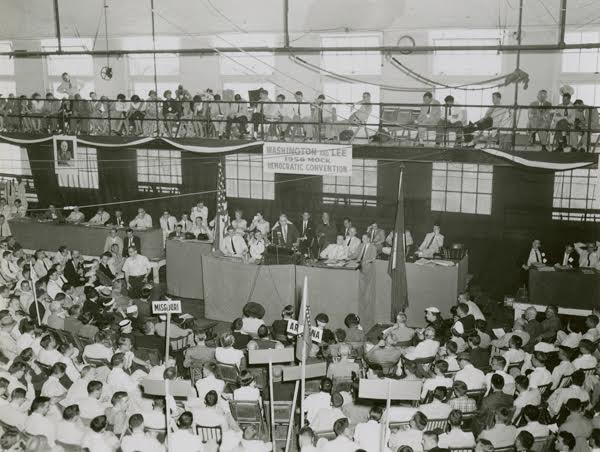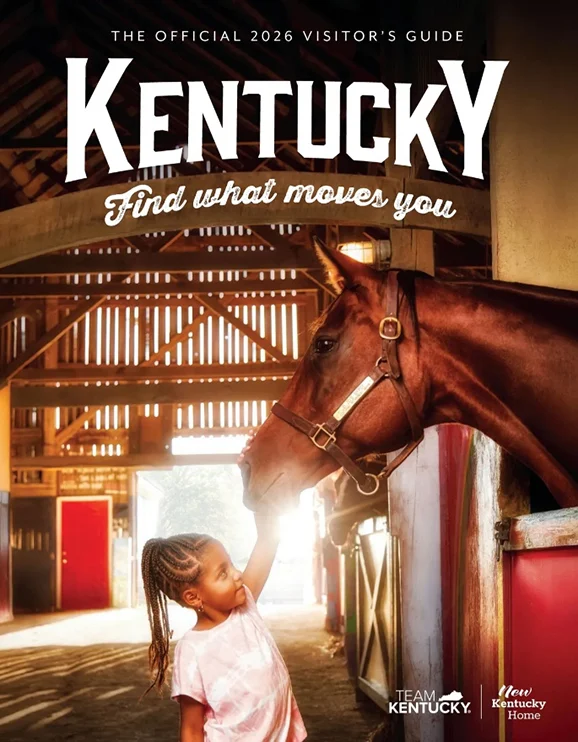By Berry Craig
NKyTribune columnist
The Robert E. Lee link lures tourists to Washington and Lee University in Lexington, Va.
The famous Confederate general is buried beneath the Lee Chapel. His storied steed, Traveler, is interred outside.
Unseen by most visitors is a small bronze plaque over a doorway in old Doremus Gymnasium. Here, on April 30, 1956, Kentucky’s most famous 20th century statesman died doing what he loved: firing up a Democratic crowd with a stem-winder speech.
“…I would rather be a servant in the house of the Lord than to sit in the seats of the mighty,” declared Sen. Alben Barkley. Seconds later, he suffered a massive heart attack, collapsed at the podium and was pronounced dead after 10 minutes, the Louisville Courier-Journal reported on May 1.

Barkley, from Paducah, was on campus to deliver the keynote address at the historic school’s quadrennial mock presidential convention. The gatherings simulate the nominating procedure for the party that doesn’t have the White House.
Republican Dwight Eisenhower was president in 1956. So the conclave was Democratic. About 1,700 students and dignitaries packed the basketball arena 60 years ago.
The gym was “sweltering,” according to Robert L. Riggs of the C-J’s Washington Bureau.
Barkley spoke for half an hour “delivering a rousing speech….The Kentucky senator, who had become a legend in his own lifetime, gave it everything he had,” Riggs wrote.
Barkley had steadily climbed the political ladder from First District congressman (1913-1927), U.S. senator (1927-1949) and vice president under President Harry Truman (1949-1953). Dubbed “the Veep” for his tenure with Truman, Barkley was senate majority leader from 1937 to 1947 and minority leader in 1947-1949.
Still popular with Kentuckians, he was reelected to the senate in 1954. He chose a desk in the rear of the chamber with the freshmen, hence the meaning of his last words.
As he spoke, Barkley gazed at banners touting the Democratic presidential hopefuls. (Adlai Stevenson, Barkley’s distant cousin, childhood playmate and the party’s nominee in 1952, would get the nod again.)
He “observed that any one of them would grace the White House,” a sidebar story recounted. “But he said he himself was not a candidate.” His disavowal prompted cries of “No!” Barkley quipped, “I was in years gone by…(but) all fire apparatus is now automotive and not horse drawn.”
“Come on, you old fire horse,” a male in the throng exhorted the 78-year-old, Graves County-born Barkley, according to the sidebar.
The Veep, “a famed spinner of humorous tales, spun his final one.”
He cited old-time Republican House Speaker Thomas B. Reed. Lampooned as “Czar Reed,” the acid-tongued Maine man sought the GOP presidential nomination in 1896.
Barkley claimed a congressman asked Reed if he thought he’d win the nomination. “They could go farther and do worse than that—and I’m afraid they will,” the speaker replied, according to the Veep.
Barkley proceeded to summarize his long political career: “I shared my Christian life half a century as a Democrat. I went to the House in 1913 and served 14 years as a junior congressman, and then I went to the Senate as a junior senator. Then I became a senior senator, then majority leader of the Senate, and then Vice-President of the United States.
“Now I’m back again as a junior senator.”
The crowd laughed approvingly, the C-J said.
“I am willing to be a junior,” Barkley continued. “I am prepared to sit in the back row. For I’d rather be a servant in the house of the Lord than to sit in the seats of the mighty.”
His second spouse, 44-year-old St. Louis socialite Jane Hadley Barkley, watched her husband gasp and fall to the platform floor, Riggs wrote.
As usual, the crowd had been with Barkley. “Like good convention delegates, the students interrupted the keynoter 10 or 15 times to shout their approval,” Riggs wrote.
The students instinctively stood when Barkley fell. They “sat back and kept fairly quiet until his body had been taken out on a stretcher,” the sidebar said. “The convention which was to have run through tomorrow, was postponed indefinitely.”
Moments before he died, Barkley “seemed suddenly to be conscious of the heat—he who had sweated it out in thousands of stifling halls,” Riggs wrote. “He said to his audience he would not keep them overlong. Soon afterward, he collapsed.”
Riggs said the Veep had received nearly a dozen invitations to speak at mock conventions on college campuses. “Barkley had accepted only the one from Washington and Lee—because it would make a short, pleasant outing [from Washington] for his wife.”
After funeral services at Foundry United Methodist Church in Washington and Broadway United Methodist Church in Paducah, Barkley was buried in Mt. Kenton Cemetery in his hometown.
Barkley’s profile and last words are carved on a large stone memorial at the intersection of Jefferson Street and Joe Clifton Drive in Paducah. The Junior Chamber of Commerce and the Kentucky State Federation of Labor sponsored the monument.
Berry Craig of Mayfield is a professor emeritus of history from West Kentucky Community and Technical College in Paducah and the author of five books on Kentucky history, including True Tales of Old-Time Kentucky Politics: Bombast, Bourbon and Burgoo and Kentucky Confederates: Secession, Civil War, and the Jackson Purchase. Reach him at bcraig8960@gmail.com


















